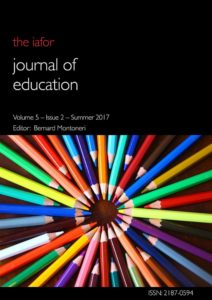IAFOR Journal of Education: Volume 5 – Issue 2
Editor: Bernard Montoneri, National Chengchi University, Taiwan
Published: September 1, 2017
ISSN: 2187-0594
https://doi.org/10.22492/ije.5.2
Editors’ Introduction
It is our great pleasure and honour to introduce the September 2017 issue of the IAFOR Journal of Education. This issue is a selection of papers submitted directly to our journal as well as studies presented during various conferences, including:
- The IAFOR International Conference on Education – Dubai 2017 (IICEDubai2017), held at the InterContinental Festival City Event Centre, Dubai, UAE, February 26–28, 2017. Conference Theme: “Educating for Change”.
- The Asian Conference on Education & International Development 2017 (ACEID2017), held at the Art Center Kobe, Kobe, Japan, March 26–29, 2017. Conference Theme: “Educating for Change”.
- The 102nd US National Communication Association Annual Convention in Philadelphia (NCA) in 2016: Communication's Civic Callings, 2016. Philadelphia, Pennsylvania, USA, November 10–13, 2016.

The second paper, entitled “Discourses on Empowerment in Adult Learning: A View on Renewed Learning” is authored by Luisa Daniele, a researcher working at the Italian Agency on Active Labour Market Policies, a governmental agency with the responsibility of monitoring and evaluating labour market policies, including training policies for employed and unemployed adults. A critical reflection is developed in the paper on the dimension of empowerment in the European discourse, starting from some operational definitions used in official documents. The author analyses the shift in the European documents from 2000 to recent years, from a lifelong learning vision to an adult education approach, basically labour market oriented, thus leaving aside the social cohesion and self-emancipatory dossiers. Against this background, a theoretical approach derived from the categories of transaction and reflexivity is suggested, setting out from the works of John Dewey. This paper investigates whether the categories of experience, problem posing and emancipation are more suitable for a long-term project on adult learning than the categories of activation, problem solving, and empowerment.
The third paper, entitled “Factors Affecting Teachers’ Perceived Proficiency in Using ICT in the Classroom”, is co-authored by Prema Basargekar and Chandan Singhavi. This study is based on the primary data collected by Professor Chandan Singhavi, who is pursuing her PhD in the area of identifying factors affecting successful implementation of ICT at the school education. Dr Prema Basargekar is her PhD guide. The survey data is collected from the teachers working in Maharashtra region from India. One of the focus areas of the research is to identify the barriers faced by the teachers in implementing ICT in the classroom. It is expected that research outcomes will benefit school management to develop new policies to mitigate some of these barriers.
The fourth paper, entitled “The Dynamics of Decentralization of Higher Education Delivery and Local Politics in the Philippines: The Case of Two Mandaue City Colleges in Cebu Province”, is written by Ronald A. Pernia. It looks at the experience of a city government in the Philippines which has two similarly named local colleges and how later on it created a conflict of legitimacy that prompted actions from the Commission on Higher Education – the national government agency tasked to oversee higher education in the Philippines. This study starts by introducing the context of the decentralisation law of 1991 and how it allows local governments to embark on establishing their own local versions of higher education institutions and then it analyses the local socio-political condition upon which the local college and local government are situated by looking at the responses from interviews, focus group discussion and pertinent documents. This study was anchored on an educational politics framework and revealed that the democratic opening engendered by the decentralisation law to allow local governments to establish post-secondary schools are confronted with tensions. However, despite this conflict there were accounts of positive impact noted in this study as a result of the venture of the city government into higher education. As such, this study suggested policy directions and practical considerations for national governments vis-à-vis the LGU’s role as enabler and/or regulator of higher education. In addition, using the concept of “politics” as a constructive force in effecting positive changes must be pursued for future research.
The fifth paper, co-authored by Jerome St-Amand, Stéphanie Girard and Jonathan Smith, is entitled “Sense of Belonging at School: Defining Attributes, Determinants, and Sustaining Strategies”. This study focuses on the sense of belonging at school. This important component of school life may have a positive impact on motivation to learn, which is considered essential for success. In their article, the authors propose a review of the existing literature related to the sense of belonging while emphasising on its attributes and determinants. Then, they describe instruments that have been used to measure it. Finally, they conclude with strategies and recommendations for stakeholders to help them build and sustain such a sense amongst their students.
The sixth paper, entitled “Friends with Benefits: Causes and Effects of Cheating During Examinations”, is authored by Leo Andrew Diego. This study argues that learners’ illegitimate means of responding to the triggering failure and frustration during examinations are not to be counted as an excuse for them to be recognised as highly innovative. Through making friends of their peers, tolerating their dishonest behaviour by giving the answer because of friendship, gaining confidence through social approval, for everyone does it, feelings of being intelligent because of cheating practices and manipulating gadgets to copy clear-cut answers should not be tolerated by teachers. The rules and codes must not merely rest in the enrolment forms or written school policies, but it must be in action, meaning to say in constant reminders given and intervention by teachers who have full authority and responsibility to hone learners in the light of honesty and maturity as enduring values in the arena of life. In this context wherein friendship was found as being manipulated and utilitarian in character, honesty is not just a policy; rather, it is the only policy for the learners to stand on a high moral ground and build self-confidence in the long run.
The seventh paper, entitled “Self-efficacy Reduces Impediments to Classroom Discussion for International Students: Fear, Embarrassment, Social Isolation, Judgment, and Discrimination”, was written by Junko Maeda. This study was an in-depth exploration of the adverse emotional factors that impede discussion participation. Using a qualitative approach, 23 international students at one university were interviewed, and their responses analysed. Students reported that fear, embarrassment, social isolation, judgment, and discrimination were barriers to participation. These findings were discussed in the context of a framework for reducing negative emotional states, employing self-efficacy theory. This framework was applied to the interview results and the author’s observation of international students’ behaviour at dormitories and university offices. These findings suggest a possible intervention approach for educators to help international students express themselves in the classroom.
The eighth article, written by Singhanat Nomnian, is entitled “Politician-Turned-Doctoral Student’s Narrative Identity at an Australian University: A Case Study”. The study highlights the participant’s transition from politics to academia that requires his action, reflection, and experimentation through venturing himself into his new role, adapting himself to the academic and research community, and negotiating his previous professional political experiences with his imagined academician. The participant’s academic and social contexts in living and studying in Australia are connected by using academic and communicative English. As a mature-age learner, he reconstructs his academic self into the Australian higher education and employs his former political experiences and connections as a strong foundation to gain his imagined expectations. His narratives of life and career transitions through investing in higher education have illustrated that his personal growth and satisfaction have been enhanced. In an era of aging society, higher education can enhance adult learners’ life-long learning that can enlighten their life and career aspirations.
The ninth article, entitled “Hearts Grow: Contemplative Learning for Inner Stability Development in Female Prison Inmates”, is co-written by Somsit Asdornnithee and Proetphan Daensilp. Due to great risks of emotional stress, including as serious as suicide found in female prison inmates in Thailand, there have been a number of projects introduced to make a change in the quality of life in prisons. However, works that can count for much in long-term development of the quality of life with the decrease in the recidivism rate are those associated with the inner skills. Inner stability is one of the important qualities signifying one’s own sustainable wellbeing. This is why applying contemplative learning process with female prison inmates could respond to such needs and allow inner transformation to happen in them. This article will elaborate on the details of the learning process facilitation appropriate for the inner stability development in female inmates, and also on their inner experiences, including some transformation found during and after the program.
The tenth article, authored by Stefan Battle, is entitled “White Teachers’ Reactions to the Racial Treatment of Middle-School Black Boys”. It recounts a study of White teachers’ responses to provocative fictionalised vignettes of classroom interactions between White teachers and middle-school Black boys. These vignettes reveal levels of stereotyping and chastising exploitation that seem to perpetuate a belief that young Black males are not as academically proficient as their White counterparts. Originating from Battle’s professional experience as a middle-school School Social Worker/Guidance Counsellor in the United States, the vignettes are suggestive of racial, social, and cultural differences between White teachers and their Black male students. The study participants were White teachers who were asked to talk and write about the actions and behaviour of the teachers in the vignettes. Their analyses of how the fictional teachers behaved toward their students considered familial, social, and professional influences on teacher-student interactions. Study participants, who indicated they had received multicultural training through professional development in their school district, overwhelmingly condemned dehumanising practices. The results indicated that such professional development likely led to an appreciation and awareness of students’ racial, social, and cultural differences and an increased sensitivity to fairly and respectfully working with Black male students.
Please note that we welcome original research papers in the field of education submitted by teachers, scholars, and education professionals, who may submit their manuscripts even though they did not participate in one of the conferences held by IAFOR. We also welcome book reviews, reviews of the literature in the field, and contributions introducing key educational scholars.
The IAFOR Journal of Education is an internationally reviewed and editorially independent interdisciplinary journal associated with IAFOR’s international conferences on education. Like all IAFOR publications, it is freely available to read online, and is free of publication fees for authors. The first issue was published in May 2013, and the journal continues to publish three issues per year. The next issues, Volume 5 Issue 3 and Volume 6 Issue 1, are scheduled for publication on December 1, 2017 and March 1, 2018 respectively; they will also be a selection of papers submitted during the above mentioned conferences. IAFOR publications are freely accessible on the IAFOR website (Open Access).
Best regards,
Bernard Montoneri, Lucy Spence, Yvonne Masters and Massoud Moslehpour
IAFOR Journal of Education

